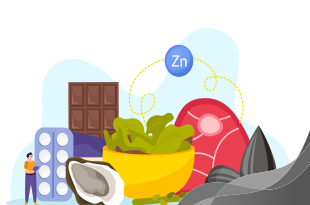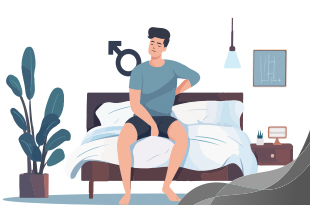Top Facts You Need to Know About Growth Hormone Deficiency
Our human body comprises various hormones that aid in the overall functioning of our body. One of these important hormones is the growth hormone. This particular hormone aids in the growth of our body. However, sometimes due to several causes, our body tends to lack the right amount of growth hormone and lack of anything in the body is a major cause of abnormalities in the body. This blog is a beneficial source of grasping the idea of what is growth hormone deficiency, what are the growth hormone deficiency causes, what causes growth hormone deficiency, symptoms of growth hormone deficiency, the identifying signs, what are the effects of untreated growth hormone deficiency, and ways to manage this deficiency of growth hormone in the body.
Learning About Growth Hormone Deficiency
Growth hormone disorder or pituitary dwarfism is less known and less people are infected every year from this disease. In this the pituitary gland that is responsible for the secretion of growth hormone is unable to provide the right amount of this hormone to the body. GHD can manifest anyone regardless of age.
Hormones are responsible for various functions in your body via transportation of messages via blood to the specific organs, tissues, and some certain muscles. Furthermore, these messages guide your body about what should be done in certain situations.
Pituitary gland is a small, pea sized endocrine gland and its placement is in the bottom of the brain just below the hypothalamus. The build up structure of this gland is based on two lobes: the anterior (front) lobe and posterior (back) lobe. However, not both lobes are responsible for the production of GH, but the anterior lobe specifically is the one producing GH in the body.
Individuals with decreased levels of growth hormones can certainly have hypopituitarism and can experience deficiencies in surrounding pituitary hormones such as:
- Luteinizing hormone
- Thyroid-stimulating hormone (TSH)
- Adrenocorticotropic hormone (ACTH)
- Follicle-stimulating hormone
- Antidiuretic hormone
READ MORE: Men’s Health Awareness: A Complete Guide
What Is The Function Of Growth Hormone?
Growth hormone (GH) aids in the functioning of many parts of the body and especially in the children it aids in growth. The secretion of this hormone in a normal range is essential in attaining the regular growth in a child/person.

Once the fusion of growth plates in the bones happens, the growth hormone stops promoting the height of a person, but due to the nature of our human body we still require GH. Once a person reaches the peak point of growth and stops growing. GH plays its role by maintaining that normal body structure and internal functioning such as blood glucose sugar levels in a normal range.
If a person does not have a sufficient amount of growth hormone no matter what age they are, they can definitely experience certain abnormalities in their bodies. However, the abnormalities are based on the age such as in the infants and children it can stop the growth and lead to dwarfism. In adults, the scenario is totally different, it can lead to several issues such as excessive body fat and increased blood sugar levels.
READ MORE: Nutrition for men: A guide to healthy eating for energy, strength, and longevity
Types Of Growth Hormone Deficiency In A Human Body
There are typically three types of growth hormone deficiency (GHD) such as:
-
Congenital GHD:
As the name suggests, this type of growth hormone deficiency manifests in an individual at birth due to several underlying reasons such as genetic changes or any issues in the structure of the infant’s brain.
-
Idiopathic GHD:
If we dig this type in literal medical terms then the word idiopathic typically means something that does not have any prominent cause. Same happens with GHD sometimes, in some cases GHD manifestations have an unknown trigger.
-
Acquired GHD:
GHD is labeled as acquired GHD if the development of the signs occurs in later life due to serious damage to the pituitary gland. Both children and adults can fall prey to this type of growth hormone deficiency.
Several medical workers had also categorized the growth hormone deficiency based on the age of onset. Moreover, the signs and procedures vary based on the age i.e., it will be different for a child and adult at the time when signs begin.
READ MORE: Hormone Replacement Therapy and Weight Loss: What’s The Connection?
Occurance Rate Of Growth Hormone Deficiency
Growth hormone deficiency is not a common medical condition. A rough estimate shows that about 1 in 4,000 to 10,000 children exhibit the signs of low growth hormone. Furthermore, approximately 1 in every 10,000 people have the manifestation of these signs when they reach their adulthood.
Signs Of Growth Hormone Deficiency
The signs of growth hormone deficiency primarily depend on the age of the patient and the time of onset of the condition.
Signs Of Growth Hormone Deficiency In Children
Growth hormone deficiency (GHD) in children leads to poor growth. The primary symptom of GHD in an infant is the slow height as compared to the normal children around. Typically they grow less than about 1.4 inches in a year.
Other less common signs of GHD children involves:
- Late tooth development
- Brittle hair and nails
- They look younger by face as of their expected age
- Micropenis (small penis) in newborn males
- Lowered blood sugar levels
- Late puberty
Signs Of Growth Hormone Deficiency In Adults
Signs of GHD in adults are different from those of children. The major ones are:
- Depression
- Anxiety
- Diminished wellbeing
- Lowered energy levels
- Lessened muscle tone
- Lowered density of bones
- Resistance to insulin leading to type 2 diabetes
- Excessive triglycerides
READ MORE: Testosterone Replacement Therapy Before and After: Is It That Effective?
Triggers Of Growth Hormone Deficiency
The main causes of growth hormone deficiency (GHD) are totally based on the age a person is in and the time when they experienced the first sign. Some of the common causes are:
- The first and common cause of onset of signs of growth hormone deficiency is the genetic abnormalities and may show signs of linkage between the brain structure abnormalities like a cleft palate or single central incisor.
Researchers have figured out many genetic alterations that can be the primary reason for the development of signs of GHD in a person, including:
-
Isolated growth hormone deficiency type IA:
This genetic abnormality leads to a decelerated fetal growth, the infant looks much smaller at the time of birth than what is usually expected from a normal infant. Individuals having the type IA majorly have normal response to synthetic treatment of growth hormone in the first trial and then they make antibodies to the hormone. This aids in preventing growth and also leads to a shorter peak adult height.
-
Isolated growth hormone type IB:
There are similarities in this type of genetic mutation and the previously discussed one but the only difference is that there is presence of a bit of GH at the time of birth in the body of an infant. Furthermore, they react to synthetic GH treatments in their life.
-
Isolated Growth Hormone Deficiency Type II:
The level of GH in this category has a lowered level of GH and shorter heights that are distinctive in terms of severity. Growth failure is typically higher in early to mid childhood. The people with this type have a half developed pituitary gland.
-
Isolated growth hormone deficiency type III:
Same like type II, people experiencing type III possess extremely lowered level GH and shortened height that is different in intensity. Growth issues are usually witnessed in mid childhood. Additionally, people with Type III have a weaker immunity system and can easily get infected with viruses.
READ MORE: Healthy Meals For Weight Loss Just For You
Therapeutic Approaches For Growth Hormone Deficiency
The best approach to deal with the signs of growth hormone deficiency is to make use of synthetic growth hormone injections that can be injected at home as well. However, the tricky part is that the sufferer will need this shot on a daily basis.
Furthermore, synthetic growth hormone is a long term treatment method. This method can take several years to gain the results. Therefore, it is compulsory to have a
` worker to check if the dose taken is correct and whether it is working or not.
Some other treatment methods for adults facing the issue of growth hormone deficiency include testosterone replacement therapy, erectile dysfunction Treatment, growth Hormone optimization, and lastly, weight loss Solutions.
Conclusion!
It is not an easy task to understand the mechanism of a human body. This is a universal fact that hormones are the building blocks of our body. They aid in the development of normal organs, muscles and bones. However, it can become a pain in the neck if your body tends to produce a lowered amount of some special hormones such as a growth hormone. The lesser amount of this hormone can lead to several defects in a person during the time of birth as well as in adulthood. Therefore, a wise choice is to always find a reliable center like Revive Men’s Health to manage and understand the signs of growth hormone deficiency.



